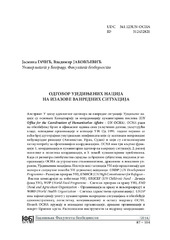Prikaz osnovnih podataka o dokumentu
Odgovor Ujedinjenih nacija na izazove vanrednih situacija, Godišnjak Fakulteta bezbednosti
| dc.creator | Gačić, Jasmina | |
| dc.creator | Jakovljević, Vladimir | |
| dc.date.accessioned | 2020-01-08T16:49:22Z | |
| dc.date.available | 2020-01-08T16:49:22Z | |
| dc.date.issued | 2014 | |
| dc.identifier.issn | 1821-150X | |
| dc.identifier.uri | https://rhinosec.fb.bg.ac.rs/handle/123456789/249 | |
| dc.description.abstract | In order to respond to emergencies adequately, the United Nations founded the United Nations Office for the Coordination of Humanitarian Affairs (OCHA). OCHA’s task is to ensure a quick and efficient response of all actors, including governments, NGOs and UN agencies. Since 1991, a large number of prolonged internal conflicts have emerged requiring continual international action (Afghanistan, Iraq, Sudan) and signalling the urgent need for more effective coordination. OCHA has three key roles: 1. coordination and the humanitarian response to emergencies, 2. the development of policies and the coordination policy, and 3. providing aid in humanitarian issues. As far as cooperation with numerous actors is considered, OCHA coordinates with the population under threat, the state and local governments, and the United Nations. Six UN agencies constitute part of the effort and aid of the UN to the community under threat: the United Nations Development Programme (UNDP), the United Nations High Commissioner for Refugees (UNHCR), the United Nations Children’s Fund (UNICEF), the World Food Programme (WFP), the Food and Agriculture Organization of the United Nations (FAO), and the World Health Organization (WHO). UNDP has the most significant role in humanitarian emergencies and provides administrative and logistical support, support in communications, and other types of support to OCHA. OCHA is also supported by non-governmental organizations, government organizations, and the Red Cross. The available instruments of support to coordinating functions of OCHA in the field also include: the Complex Emergency Response Branch (CERB), the Emergency Liaison Branch (ELB), the United Nations Disaster Assessment and Coordination team (UNDAC), the Military and Civil Defense Unit (MCDU), and the International Search and Rescue Advisory Group (INSARAG). | en |
| dc.rights | openAccess | |
| dc.source | Godišnjak Fakulteta bezbednosti | |
| dc.subject | UN | en |
| dc.subject | OCHA | en |
| dc.subject | emergencies | en |
| dc.title | Odgovor Ujedinjenih nacija na izazove vanrednih situacija, Godišnjak Fakulteta bezbednosti | sr |
| dc.type | article | |
| dc.rights.license | ARR | |
| dcterms.abstract | Гачић, Јасмина; Јаковљевић, Владимир; Одговор Уједињених нација на изазове ванредних ситуација, Годишњак Факултета безбедности; Одговор Уједињених нација на изазове ванредних ситуација, Годишњак Факултета безбедности; | |
| dc.citation.spage | 87 | |
| dc.citation.epage | 114 | |
| dc.citation.other | : 87-114 | |
| dc.citation.rank | M53 | |
| dc.identifier.fulltext | https://rhinosec.fb.bg.ac.rs/bitstream/id/117/246.pdf | |
| dc.type.version | publishedVersion |

